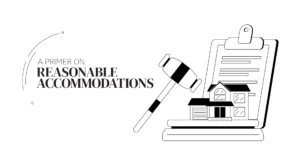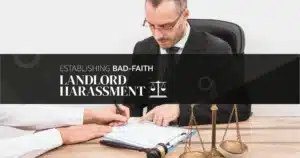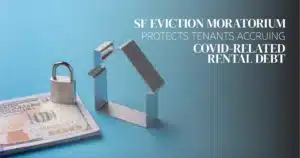Getting an Ellis Act eviction notice is like getting hit by lightning. One day, everything’s fine. Next, you get a paper saying, “You have 120 days to leave.” No warning. Just like that, your home isn’t yours anymore.
Maybe you live on Market Street. Maybe your kids grew up in this apartment. Maybe you fixed the leaky sink yourself because the landlord didn’t. And now they say it’s over?
I’ve had people walk into my office holding these notices like they were holding a bomb. They ask, “Can they even do this?” And I say: Not so fast.
This guide is for people like you—tenants in San Francisco who just got an Ellis Act notice. I’ll explain what the Ellis Act is, how it’s misused, and how people like you are fighting back. And winning.
What Is the Ellis Act—& Why It Matters on Market Street
The Law That Lets Landlords Leave the Rental Business
The Ellis Act is a California law. It started in 1985. It lets landlords say, “I want out of the rental business,” and kick out all their tenants. Sounds final, right?
But here’s the truth: Most landlords who use the Ellis Act aren’t “leaving the business.” They just want to raise the rent or sell the building. I’ve seen it again and again. It’s legal on paper—but in real life, it’s often used like a weapon.
San Francisco’s Additional Rules—& How They Help
San Francisco has extra rules on top of the state law. Landlords must:
- Give tenants at least 120 days’ notice
- File special papers with the Rent Board
- Pay money to help tenants relocate
These steps are not optional. If a landlord skips even one, the whole eviction could fall apart. You’ve got to check every detail. Because sometimes, one mistake is all it takes to stop the eviction.
Market Street Tenants: A Real-Life Case
Let’s talk about 1049 Market Street.
In 2016, 22 tenants there received Ellis Act eviction notices. Some lived there for decades, but they didn’t pack up. They fought back—through court filings, newsroom coverage, zoning appeals, and working with nonprofits.
Their story even featured on KQED: “Tenants on S.F.’s Market Street Fight Major Ellis Act Eviction.” Tenants stood their ground and made the whole city pay attention.
Can I Fight an Ellis Act Eviction in San Francisco?
Recent Legal Case: San Francisco Writ Challenge (A166228)
In 2024, a big landlord group sued the City. They didn’t want to give tenants more notice. They said, “The state law already covers this.”
The court agreed—sort of. Some of San Francisco’s local protections got struck down. But that doesn’t mean landlords can do whatever they want.
What That Means for Tenants Like You
You can still fight. You just have to fight smart. Focus on what the Ellis Act says. Focus on what the landlord did—or didn’t do. If they break the rules, you’ve got a shot.
We check everything. We look for mistakes. And we take it to court.
What Are My Rights Under the Ellis Act in California?
The Full Withdrawal Requirement
If a landlord uses the Ellis Act, they have to remove all units—not just some. That’s the law. No picking and choosing.
I’ve seen landlords try to evict one tenant and then sneak in someone new. That’s illegal. If it happens, take pictures. Keep records. That kind of proof can win your case.
Relocation Assistance: How Much Are You Owed?
If you’re getting kicked out under the Ellis Act, the landlord must pay you. Here’s how much:
- $10,000 per tenant
- Add $6,700 if you’re over 62 or disabled
- Max per household: $30,000
Check the math. I’ve seen landlords “accidentally” underpay. Or forget to count grandma. Don’t take their check until someone like me looks at it.
Extension Rights for Seniors and Disabled Tenants
If you’re 62 or older—or disabled—and you’ve lived there for a year, you can stay up to a full year after notice. That’s not a favor. That’s the law.
But you only have 60 days to ask for it after getting the notice. Miss that window, and you lose the right. We can help you file the paperwork the right way—and on time.
How Much Time Do I Really Have Under an Ellis Notice?
The Standard 120-Day Period
Every tenant gets at least 120 days after getting a valid Ellis Act notice. That’s four months. The countdown starts once the landlord does the paperwork correctly.
If they mess that up, the notice might be invalid. Yes, we can challenge that in court.
Seniors and Disabled Tenants: Do You Qualify for More Time?
You might. And if you do, take that time. Use it to fight. Use it to get organized. Use it to make a plan.
I’ve seen tenants win because they didn’t rush. The extra months gave them power.
Examples of Landlord Abuse of the Ellis Act in SF
640 Octavia LLC (July 2023): Intent Matters
This landlord said they were leaving the rental business. But the facts didn’t add up. Tenants tried to stop the eviction in court. They didn’t win—but the judge said the landlord’s intent mattered.
If your landlord lies about quitting the rental business, we can fight them.
Helen Byrne, Age 94: The Power of Public Pressure
Helen Byrne lived in her apartment for 80 years. When the landlord tried to evict her, the City pushed back. Lawyers, community groups, and the news all got involved.
Guess what? The landlord gave up.
Sometimes, the court isn’t the only battlefield. Public pressure works, too.
Market Street Tenants, 2016: Organized Resistance
Tenants at 1049 Market Street received Ellis notices in 2016, too. But they didn’t run. They stood together. They filed motions. They worked with nonprofits. They challenged zoning rules.
Their fight lasted years. It still matters today.
Tenants Who’ve Successfully Fought Ellis Act Evictions
Barrington Plaza (June 2024): LA Tenants Win Big
This Los Angeles case was huge. The landlord said they were leaving the rental business—but they weren’t. The court saw through it.
Over 470 families kept their homes. That win now helps tenants in S.F. fight back, too.
West LA Case (June 2024): Pattern Repeating
Another LA landlord tried the same trick. They failed again. Judges are catching on. They’re not buying weak excuses anymore.
That’s good news for tenants like you.
San Francisco Retrial Win (1999)
In 1999, a landlord told tenants to leave under Ellis. But then they kept collecting rent. That’s a big no-no.
The judge threw out the verdict and gave tenants another shot. That case is still used in court today. So yes—you can win.
How to Get Legal Help for an Ellis Act Eviction in SF
Hire a Tenant-Rights Firm (Like Ours)
Ellis Act cases are tricky. You need lawyers who know San Francisco laws inside and out. That’s us.
We don’t back down. We go to court. And we win.
Use the San Francisco Rent Board
The Rent Board can help. If your landlord skips a step or underpays you, the Rent Board can step in.
We’ve representation at the Rent Board. We know how to file the right complaints and get results.
Connect with Tenant Nonprofits
Groups like Tenderloin Housing Clinic and San Francisco Tenants Union are amazing. They give free help. They stop evictions. And they organize.
We work with them often. Together, we’re stronger.
Final Steps: How to Fight an Ellis Act Eviction in S.F.
Step 1 – Investigate Landlord Intent
Are they really leaving the rental business? Or is this just a trick?
Step 2 – Check Notice and Payment
Did they file the notice right? Did they pay you the right amount?
Step 3 – Know Your Extensions
Are you 62+ or disabled? You may get 365 days to stay.
Step 4 – Collect Evidence
Keep texts, emails, letters, pictures—everything.
Step 5 – File a Complaint
Go to the Rent Board. We’ll help you do it right.
Step 6 – Take Legal Action
We file lawsuits. We go to court. And we don’t flinch.
Step 7 – File an Appeal if Needed
Didn’t win the first round? We try again. Appeals can change everything.
Your Rights. Your Fight. Our Mission.
You’ve got more power than you think. The Ellis Act may be the law—but it’s not unbeatable. And with the right legal strategy, you can push back hard.
I’m Attorney Rahman Popal, and I’ve built my firm around one principle: standing up for tenants. We don’t just give advice—we take action. We challenge landlords. We expose shady tactics. We defend homes. And we win.
If you’ve received an Ellis Act notice, don’t wait. Every day counts. Call us now. The sooner we get involved, the stronger your case can be.
It’s your home. Let’s fight for it—together.





